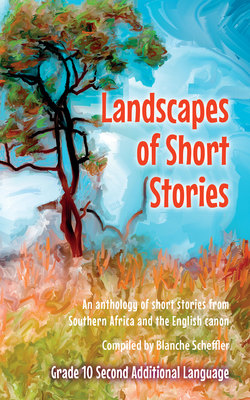Читать книгу Landscapes of short stories for Gr 10 Second Additional Language - Blanche Scheffler - Страница 7
На сайте Литреса книга снята с продажи.
Hearts which are alike
ОглавлениеA Venda oral narrative retold by G.P. Lestrade
A note about the story
As in all folk tales, the story line is uncomplicated and easy to follow; the language is simple and straightforward; and the characters are flat. The narrator uses a simple tale to make a point about life and the way we deal with it.
The story is about the effect a famine has on a relationship, in this case between a man and wife. We do not learn much about them, not even what they look or are like: they are flat characters. This, because the focus is on only one circumstance: the famine and, by implication, their hunger and, perhaps also, their sense of insecurity. But the husband and wife do learn something and their relationship and circumstances change for the better. And so we learn what the message of this folktale is.
Note how the writer uses contrast in the first and last paragraphs to bind the story, while establishing its message at the same time.
Pre-reading
•What kind of relationship do you associate with the title?
•Why is the first sentence of this story important?
•Skim the text for names. What do they suggest to you about the characterisation?
During reading
•While reading the story, try to identify two things that influence what the characters do.
•Think about the guinea-fowls:
–the role they play in the story
–the size of such a bird, and what this suggests to you about what the characters are doing.
Hearts which are alike
Famine was once great in the land. Now in those days a certain man and his wife were living in their village, they two. For them their life there at home was difficult, because they did not get on with each other on account of the famine. While the one said: ‘You are finishing the food for me’, the other said: ‘It is you, you always eat a lot.’
This man was a great hunter of guinea-fowl. In his wife’s cooking-hut there were placed hanging-poles which were hung full of bodies of guinea-fowls. In those days they were living on guinea-fowl meat. But though the meat was plentiful, they continually kept on not getting on with each other.
It happened that, one day, the man took down one guinea-fowl from the platform, and gave it to his wife so that she might cook it, and it would be their supper.
Well, the guinea-fowl was put on to the hearth, and the man went out, and went to hunt.
When the man had gone away, and the hearth had started roaring, the woman, taking the lid off that pot which was on the hearth, found the meat already done, and she spoke, and said: ‘Seeing that the day is still so much in the midday, let me take this guinea-fowl out of the water, and let mwwe put in another. My husband, since I know that he has gone to hunt, will not come back soon: he will find this other one already done, and will not know that it is not the same.’
Right then that woman took that guinea-fowl out of the water, and put in another one there into the pot.
Now there in the cooking-hut there was a large clay grain-bin into which, when the land was peaceful, they regularly poured eleusine3. It was then that the woman said ‘Let me hide carefully behind it, so that even if the man comes back while I am still busy eating he may not quickly see me.’ So things were, and she hid herself behind the grain-bin.
Right then the man arrived, looking about in the courtyard and in the cooking-hut, saw that the woman was not to be seen, spoke in his heart, and said: ‘My wife has gone to the river: let me take that guinea-fowl out of the water, eat it, and put another one into the pot, since a good deal of the day is still there; and also since my wife, when going to the river or to gather wood, does not return soon. She will find this other one already done, and will not know that it is not the same.’ He also said further: ‘On the other hand, perhaps she may have been gone a long time, she may already be coming back; and if she finds me eating, she will scold me. Let me hide behind the grain-bin, so that she shall not find me.’
Now when he says: ‘I am going to squat down behind the grain-bin to hide’, he finds his wife squatting right there behind the grain-bin, and eating another guinea-fowl.
Right then those people, both of them, the man and the woman, began a new life. They no longer troubled each other, they diligently searched for food during that famine, and the land was again at peace.
Post-reading
1.Explain why the man and woman have problems in their relationship.(2)
2.Give a brief outline of the plot.(10)
3.Compare the actions of the woman with those of her husband.(4)
4.What does the woman’s attitude towards her husband reveal about her character?(2)
5.Do you empathise with one particular character? What would you have done if you had been in the same situation?(3)
